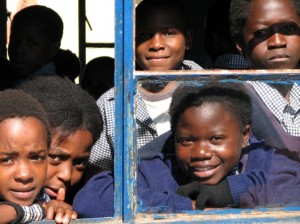
Perspectives on Sexual Violence from Cornell’s Recent Gender & Justice Conference
November 15, 2012Policy/Contributor Blogs ArticleAt Cornell Law School’s Women & Justice Conference held on October 18-19, 2012, the law school’s Avon Global Center for Women and Justice, the Cornell International Human Rights Clinic, Women on Law in Southern Africa-Zambia (WLSA-Zambia) launched a report on sexual violence against girls in Zambian schools. Three of the conference participants agreed to share some of their thoughts on the event: Gertrude Chawatama, a former judge of the High Court of Zambia and current Commissioner of the Kenya Truth, Justice, and Reconciliation Commission; Sharon Newa, Deputy Registrar of the Zambia Commercial Court; and Matrine Chuulu, Regional Coordinator of WLSA.
How do you think that the report will help to address the problem of sexual violence?
Ms. Chuulu: WLSA’s methodology is to complete regional reports. We want to produce a regional report to make comparisons between different countries. Once the Zambia report is widely disseminated and accepted, we can start to take the next step.
What, for you, has been the highlight of the conference?
Hon. Chawatama: The fact that we agreed that we have a problem and we need to do something about it. Part of problem will be resolved by us as adjudicators in the courtroom, part with initiatives outside of the courts, such as outreach and speaking to schools and communities. We must be role models for young girls, to persuade them not to give up and to create awareness.
Ms. Chuulu: It was also very interesting to hear the judges give their perspectives about what they’re doing to increase access to justice and how they act outside the box. More access helps to demystify the court system and make it more user-friendly.

From left to right: Ms. Matrine Chuulu (Regional Coordinator of WLSA), J. Sharon Newa, and J. Gertrude Chawatama.
Are there any social or cultural practices that you would like to see changed or improved, relating to sexual violence?
Hon. Newa: There is a lot of secrecy when these offenses happen. I think this is what is perpetuating the problem, because people are looking at a way to avoid embarrassment.
Ms. Chuulu: In our customary practice, a child is to be present, but not heard. That also is a factor in these cases. Also, there is little or no sexual education for girls.
Why would you say that is?
Hon. Chawatama: Women are often afraid to reveal what they know about sex because the man will turn around and blame the woman. Instead of being free with information, my grandmother used to say that if you sleep with a man, your fingers will grow.
Hon. Newa: My mother never explained sex to me. She said, what is the relevance?
Hon. Chawatama: But things are changing, times are changing. The patriarchy, most of them want to take advantage of customary practices. They know that it’s negative, but they keep it there because it’s more convenient. Sometimes it’s not even authentic customary law. For example, child marriages have been perpetuated because of their links to poverty. It results from the circumstances people find themselves in, where the marriage of a child means one less mouth to feed.
You may also like
2 comments
- April 2024
- March 2024
- February 2024
- November 2023
- October 2023
- April 2023
- March 2023
- February 2023
- January 2023
- December 2022
- November 2022
- October 2022
- May 2022
- April 2022
- March 2022
- February 2022
- January 2022
- December 2021
- November 2021
- October 2021
- May 2021
- April 2021
- March 2021
- February 2021
- January 2021
- November 2020
- October 2020
- September 2020
- August 2020
- July 2020
- June 2020
- May 2020
- April 2020
- March 2020
- February 2020
- January 2020
- November 2019
- October 2019
- September 2019
- April 2019
- February 2019
- December 2018
- November 2018
- October 2018
- September 2018
- March 2018
- February 2018
- January 2018
- December 2017
- November 2017
- October 2017
- September 2017
- May 2017
- April 2017
- March 2017
- February 2017
- December 2016
- November 2016
- October 2016
- April 2016
- March 2016
- February 2016
- January 2016
- December 2015
- November 2015
- October 2015
- June 2015
- May 2015
- April 2015
- March 2015
- February 2015
- January 2015
- December 2014
- November 2014
- October 2014
- August 2014
- March 2014
- February 2014
- January 2014
- December 2013
- November 2013
- October 2013
- September 2013
- May 2013
- April 2013
- March 2013
- February 2013
- January 2013
- December 2012
- November 2012
- October 2012
- September 2012
- June 2012
- April 2012
- March 2012
- February 2012
- January 2012
- December 2011
- November 2011
- October 2011
- September 2011
- August 2011
- April 2011
- March 2011
- November 2010
- October 2010
- September 2010


This is a great post! I think it is also important to emphasize what we can each so as individuals to combat this pervasive culture of violence towards women. Things like using gender-neutral language and intervening when others make jokes about rape are useful reminders that no amount of gender-based slander or sexual violence is permissible.
I think what these women are doing is incredibly important – the first step towards changing an established system is to show people that there really is a problem and to educate them as to what it entails. It is really interesting to hear directly from some of the people that are trying to provide solutions to the problems of sexual violence in different countries and to learn their perspectives on what needs to be done.